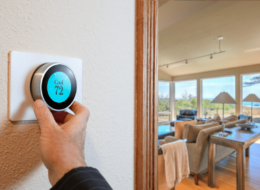It’s a sad and unfortunate fact that seniors often become targets for scammers and fraudsters.
Scammers often prey on a senior’s vulnerabilities, from loneliness to lack of modern technical knowledge, and try to coerce senior citizens into sending money or offering personal information that can result in identity theft.
It’s essential that older adults are aware of some of the most common scams targeting seniors so that they can better avoid being taken advantage of.
Below, we’re detailing the most common senior-targeted frauds, along with some tips on how to avoid them.
1. The Grandparent Scam
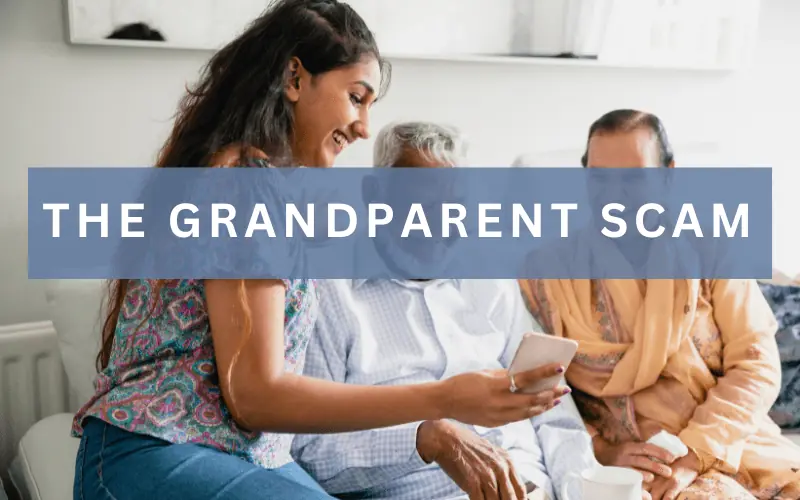
The grandparent scam is one of the most common scams targeting seniors. Typically, a phone call will come in and an individual posting as the senior’s grandchild will tell the elder on the other end of the line that they are in some kind of trouble, usually involving money.
They’ll often request help with bills, bail money, or medical expenses and promise to pay it back soon.
This can be particularly dangerous for an older adult because even if they are suspicious, they may feel obligated to help someone claiming to be their grandchild. Scammers know this and prey on a senior’s sympathy in order to fool victims.
How to Avoid Falling Victim: To avoid falling victim to this scam, always ask probing questions you would usually ask your family members, such as what certain relatives are doing these days or when was their last visit home.
If something feels off about the conversation, hang up and verify if the story is true by calling another family member first before sending any money.
2. Counterfeit Prescription Drugs

Counterfeit prescription drugs have become increasingly prevalent, especially among older adults.
Scammers are able to find ways to make fake medications look like they come from a legitimate source, and then sell them at discounted prices or offer them for “free”.
Often counterfeit drugs are discovered through online sites, where seniors are increasingly looking for a better price for specialized medications.
A person who purchases unsafe drugs may also buy dangerous goods and services which can cause a lot of suffering. These scams can hurt the body as much as the wallet.
How to Avoid Failing Victim: Only purchase prescription drugs from a pharmacy you know and trust — never use sites to order drugs online that you are unfamiliar with.
3. Government Impersonation Scams

In government impersonation scams, a scam artist calls unsuspecting older adults pretending to work for a federal agency such as Medicare.
The “government employee” may say benefits will be suspended if the senior fails to provide a name, address, credit card, or some other type of personal information, which is then used to seal the individual’s identity.
Government imposters may require particular payment forms like prepaid cards or bank transfers.
In some cases, they may even demand that the senior pay a fee to receive their Social Security check or other government benefits.
How to Avoid Falling Victim: Government agencies will never call and ask for your personal information or bank account info. If you’re contacted by someone claiming to be from a government agency, hang up and contact the actual organization directly via phone to verify the information.
4. Fraudulent Anti-Aging Products

The anti-aging industry has always — and continues to be — a hotbed for scammers. Many older Americans are looking into new treatments for youthful appearance, and scammers are all too happy to prey on those looking to reduce fine lines and wrinkles.
Fraudsters often resort to tactics like fake testimonials and false claims of scientific studies to push their products onto unsuspecting seniors.
These unscrupulous sellers may even use celebrity endorsements and paid influencers to make their products seem more credible, when in reality they are selling nothing but snake oil.
How to Avoid Falling Victim: Always do your research and look for legitimate reviews of any product you are considering. Better yet, consult with your dermatologist on safe and effective treatments that don’t involve shady operators.
5. Online Shopping Scams

In our digital age, many seniors are turning increasingly more to online shopping for convenience. Unfortunately, this increased access to the internet also opens up seniors to an array of scams from fake websites that offer bogus products or discounts.
Many of these sites often look legitimate, but are actually fronts used simply to collect customer information and steal credit card numbers.
In an annual study, a federal regulator highlighted online shopping fraud as being the most commonly used form of scam targeting older adults.
How to Avoid Falling Victim: Only make purchases from sites that you know and already trust. If you are considering purchasing from an unfamiliar site, run a Google search for the business name and look at websites like Trustpilot and Better Business Bureau to read other customers’ experiences with the website. Be critical and remember that ads offering too-good-to-be-true discounts are likely fake — especially when they are appearing in Facebook or websites’ comments section.
6. Medicare Scams

There are several types of Medicare scams, largely due to the fact that scammers know seniors are reliant on Medicare and will pay attention when a supposed Medicare representative calls.
A fraudster might say you need a Medicare card and will request your contact details and other personal information. They’re usually simply selling your personal details or using your personal data in order to steal your identity.
Another type of Medicare fraud is an attempt by a scammer to swindle the Medicare system. These scammers set up phony companies or organizations and use them to bill Medicare for bogus services never rendered.
Medicare scams can also involve people going door-to-door offering free medical equipment or a free “medicare checkup” in exchange for personal information.
How to Avoid Falling Victim: Don’t give out your Medicare details, including card numbers or social security number over the phone. Medicare representatives will never call you and ask for your personal information. If someone contacts you claiming to be from Medicare, hang up and contact your local social security office directly.
7. Online Romance Scams
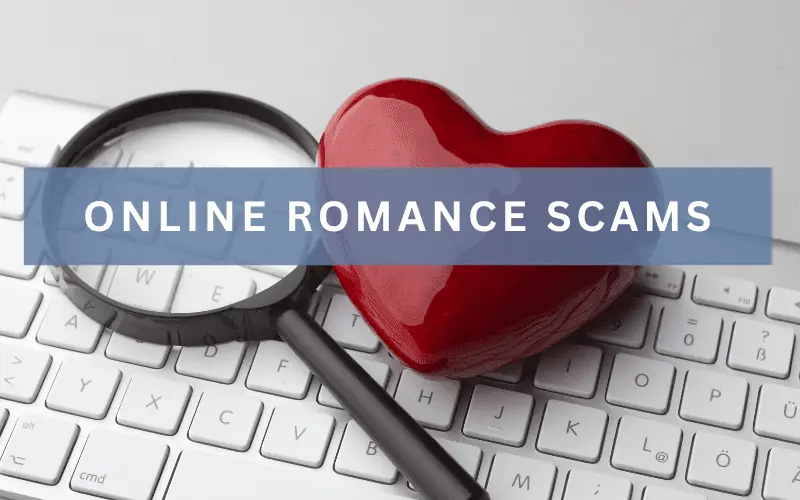
Romance scams occur when a scammer develops a romantic relationships with a senior, and ends up asking for money.
With the increased popularity of online dating sites, and with not-so-tech-savvy seniors looking to online dating to feel a little less lonely, romance scams have become commonplace.
Scammers are usually very convincing, and can be quite persistent. They may even offer a sob story to gain sympathy, as well as send gifts or tell sweet lies in order to build trust.
The scammer will then ask for money to help with medical bills, travel plans, or other needs.
How to Avoid Falling Victim: Be wary if the person you’re talking to is asking for money or personal information, or is trying to move the conversation off of the dating site too quickly. If something seems suspicious, it probably is — trust your gut and don’t send money. Additionally, use reputable dating websites with strong security protocols in place. If you suspect you may be dealing with a scammer, alert the dating website’s security team, who will take swift action.
8. Sweepstakes and Lottery Scams
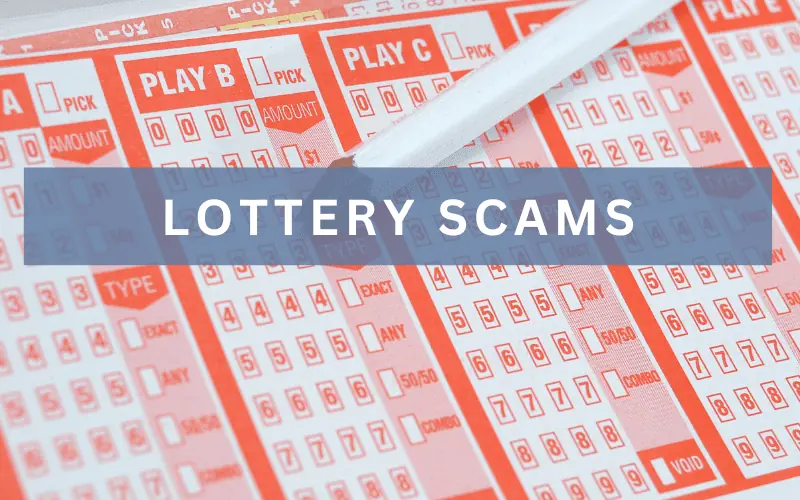
Sweepstakes scams and lottery scams involve an elderly senior receiving a call or letter informing them that they have won a large sum of money.
In order to claim their prize, they are asked to provide personal information like bank account numbers and social security numbers, or pay a “processing fee” at a substantial cost to the senior.
Sweepstakes scam artists may impersonate well-respected sweepstakes groups to prey on the victim’s trust of a known business.
How to Avoid Falling Victim: Legitimate sweepstake companies won’t ask you to pay a fee in order to claim your prize. Don’t provide personal information or financial details to any unknown caller.
9. Funeral Scams

Funeral scams target grieving families in a time of need. In these scams, pre-paid funeral services are offered, promising to cover all future funeral expenses down the line, only to take off and run with the money while providing no services.
In one infamous scam, a Missouri man and several co-conspirators were sentenced to federal prison for a Ponzi-style funeral scheme that scammed 97,000 customers across 16 states, totaling over $450 million in losses.
According to the Federal Trade Commission, millions of Americans enter into contracts to pre-organize their funerals and pay for some or all the related expenses in advance.
State laws control the industry, with such regulations being inconsistent across states – leaving room for fraudulent operators to take advantage of unsuspecting consumers.
How to Avoid Falling Victim: There are some legitimate pre-paid funeral plans offered through funeral homes, but you need to do your research and tread carefully. Make sure to read the fine print, understand where your money is being held (according to the FTC, the money must be placed in a safe holding place such as a life insurance policy), and research the company via third-party rating sites to ensure authenticity.
10. Computer Tech Support Scams

Tech support scams target seniors who do not understand computers or cyber security.
Sometimes pop-up browser windows or error screens are displayed, telling the user to call a number in order to fix the device.
Once the senior calls, a fake scam “tech support” member will request a remote connection to gain access the senior’s computer and demand a repair fee to install a fake anti virus program to get rid of a virus the scammer installed themselves.
Other tech support scammers will impersonate companies like Apple and Microsoft and try to trick seniors into sending money to fix a security problem that doesn’t exist.
Senior citizens who are 60 and older are 398% more likely to fall victim to tech support scams than younger folks ages 18-59.
How to Avoid Falling Victim: Don’t call any suspicious numbers in response to pop-up messages. Instead, install legitimate anti-virus software such as Avast, Norton AntiVirus, or McAfee and make sure the software is up to date, so that it can detect malicious programs such as ransomware or an actual virus that may be causing the issue.
11. Robocalls and Phone Scams
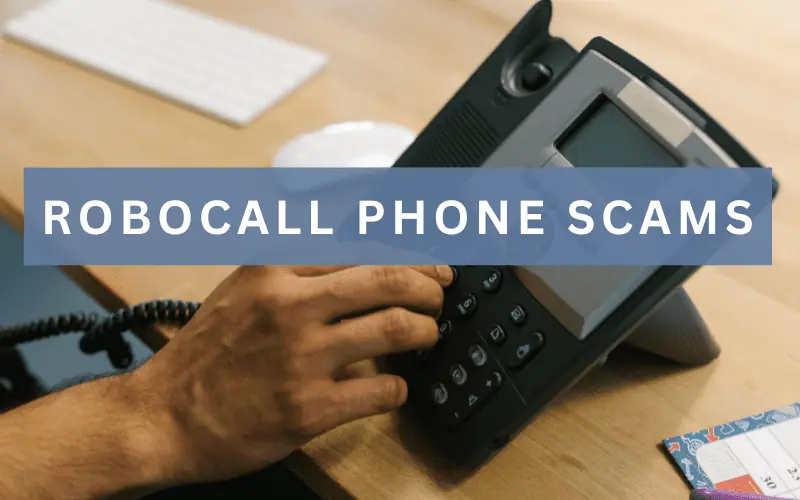
Robocalls and phone scams target elderly individuals through cold calls, automated messages, or spoofed caller ID numbers. Robo-callers take advantage of advanced telephone technology to contact households from virtually any location, using local area codes.
In these scams, callers often pretend to be from a reputable company such as the IRS in order to get seniors to provide personal information.
They may also offer fake services that can help you “improve” your credit score through credit monitoring services or “reduce” your debt.
A phone call scammer may indicate that a vehicle warranty or other type of common warranty has expired and may demand payment for renewal.
How to Avoid Falling Victim: Don’t answer phone calls from unknown numbers, and don’t respond to any requests for personal information. If you suspect a warranty truly may need renewal, simply hang up and call the product manufacturer and renew the warranty through them directly.
12. Homeowner / Reverse Mortgage Scams

Reverse mortgages are a legitimate financial tool that can be useful for seniors who have significant home equity but limited retirement income.
Essentially, a reverse mortgage allows homeowners to borrow against the equity in their home, with the loan balance increasing over time as interest accrues.
Unlike traditional mortgages, reverse mortgages do not require borrowers to make monthly payments, as the loan balance is typically paid off when the borrower moves out of the home or passes away, and the home is sold.
For seniors who have limited income but significant home equity, a reverse mortgage can provide a source of income that allows them to age in place and maintain their independence. This can be a huge boon for those who do not have sufficient retirement savings or who face unexpected expenses, such as medical bills or home repairs.
However, there are also risks associated with reverse mortgages — some unscrupulous organizations use reverse mortgage scams to exploit vulnerable seniors and strip them of their home equity.
One scam involves convincing seniors to take out a reverse mortgage and then using high-pressure tactics to convince them to invest the proceeds of the loan in fraudulent or high-risk investments.
Another common reverse mortgage scam involves targeting seniors who are facing foreclosure and convincing them to sign over the title to their home in exchange for a reverse mortgage.
In these cases, the scammers may take ownership of the home and sell it, leaving the senior without a place to live and no way to recoup their equity.
How to Avoid Falling Victim: To protect against reverse mortgage scams, it is important for seniors and their families to be aware of the risks and to do their due diligence before signing any agreements or handing over any money. This may involve consulting with a trusted financial advisor, conducting research on the lender or investment opportunity, and being cautious of high-pressure sales tactics or promises of guaranteed returns.
13. Charity Scams
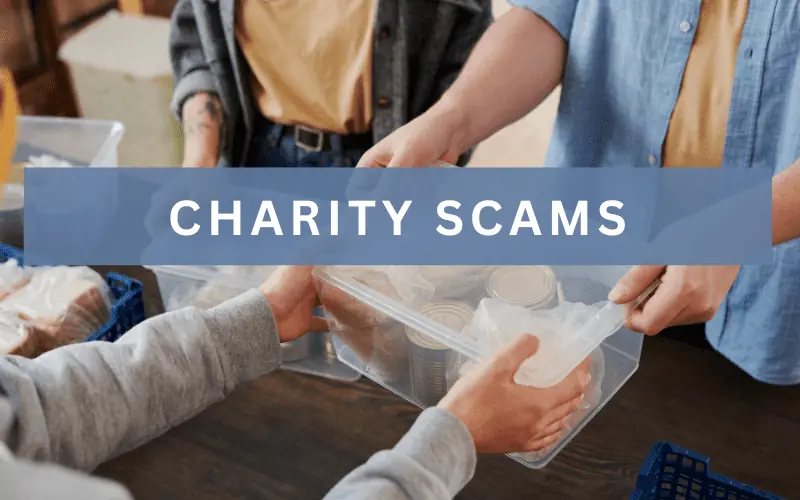
Charity scams target older adults who might be more likely to donate money to charitable causes.
In these scams, scammers will call or email and ask for a donation, often in the form of gift cards or wire transfers. The senior is told their funds will help a certain cause or person but in reality, the scammer keeps all of the money.
How to Avoid Falling Victim: Never give out financial information over the phone or internet to a charity you are not already familiar with and have donated to in the past. Check that the charity is registered before making any contributions. Additionally, be wary of any charity that asks you to pay with a gift card or wire transfer. These are not accepted forms of payment by legitimate charities.
14. Email/Phishing Scams

Phishing scams involve emails sent from fraudsters who claim to be from legitimate companies (imposing all kinds of well-known companies, from CVS to Home Depot).
These emails usually contain links or attachments containing malware.
Seniors are tricked into clicking on the link or downloading the attachment unknowingly, which gives the scammer access to their personal data and information.
How to Avoid Falling Victim: Don’t download attachments from senders you don’t recognize. Additionally, always carefully examine the email address sent by a company requesting you to click a link or download an item — always look for a “.com” email address with the brand’s name in the email address.
Common Goals of Senior Scammers
When it comes to scamming seniors, most scam artists are limited to a few specific goals:
- Identity Theft. Many scammers’ goal is simply to collect as much information as possible about the senior, such as one’s address or date of birth, in order to commit identity theft.
- Easy Money. The other main goal of scammers is to get quick, easy, non-traceable money. This is why scammers often ask for money orders. Never send money through wire transfer without knowing for certainty who you are sending the money to, and get the help of your bank to confirm security details.
How to Avoid Elder Financial Abuse
Financial abuse is one of the common types of elder abuse that older adults face. Here’s how you can take steps to avoid becoming a victim:
- Never give out personal information over the phone. Avoid providing any personal or financial information, including details regarding bank accounts over the phone to anyone who has called you. 24% of all frauds committed against seniors were conducted over the phone (source).
- If you’re unsure about the caller’s legitimacy, call back at an official number. If you suspect a call could potentially be a scam, always hang up and call back the company or business at their official phone number shown on their website to avoid doing business with an imposter.
- Report Fraud. Be sure to report any suspicious activity or suspected fraud to your local state’s consumer protection division.
It’s always important for seniors, and those who care for them, to discuss common frauds and scams so that seniors are aware of the risks.
Also be sure to explain to seniors the mechanics of common schemes and what not to do so that they can recognize any potential threats and protect themselves from becoming victims.
FAQs About Elderly Senior Scams
What age group falls for scams the most?
Surprisingly, Gen Xers, Millennials, and Gen Z young adults (ages 18-59) were found to be 34% more likely than older adults (ages 60 and over) to report losing money to fraud — specifically, losing money to online shopping fraud, in which they never received the items they ordered.
Younger adults were also 4x more likely than older adults to report a loss on an investment scam (most often bogus cryptocurrency investments).
However, older adults ages 60 and above were 5x more likely than younger adults to report losing money on tech support scams than younger adults.
Older adults were also 2x more likely to report losing money on a sweepstakes scam or lottery scam.
How much money do seniors lose to scams?
The median individual loss to fraud for those ages 70-79 was $800, and a $1,500 for those 80 and over.
What are the 3 most common types of scams?
The most common scams across the board are online shopping scams, business imposter scams, and financial investment scams.
However, for senior citizens ages 60 and over, the most common senior targeted scams are tech support scams, business imposter scams (such as someone posing from the IRS or Medicare), and sweepstake or lottery scams.


